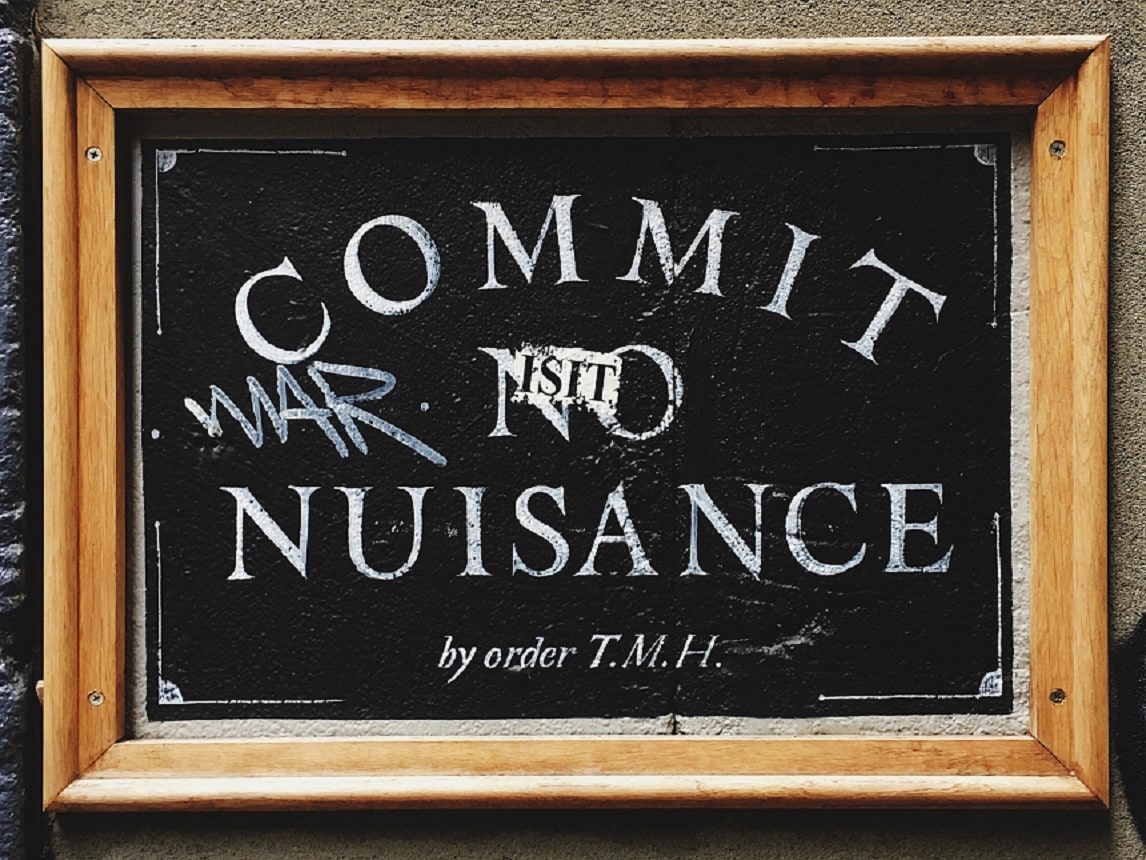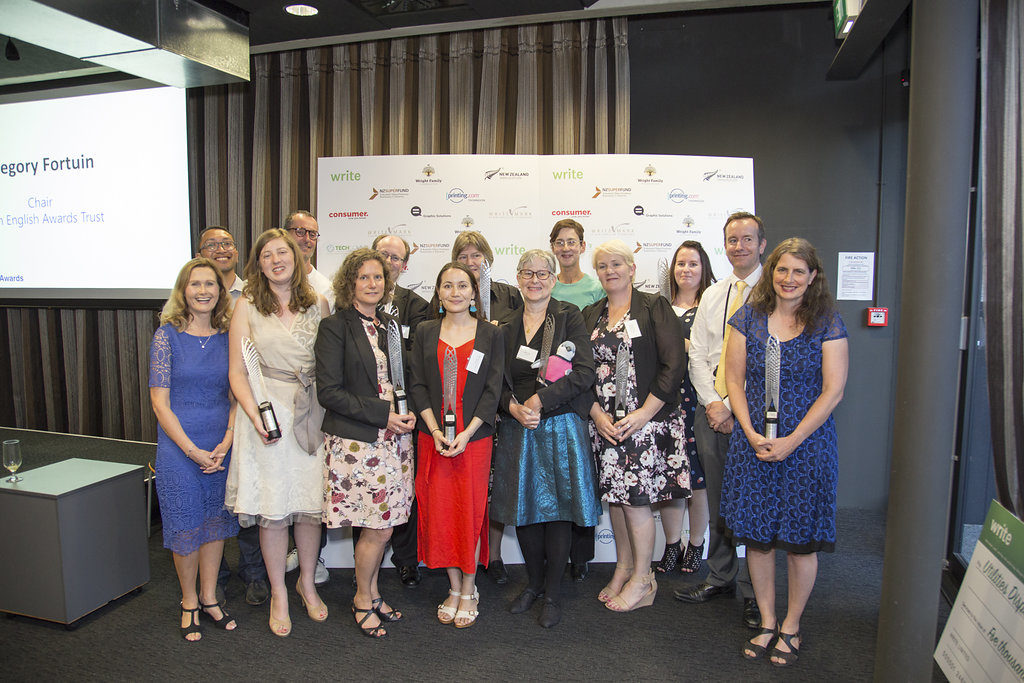
Winning the People's Choice Award will have you jumping for joy. Image by Andre Hunter. Unsplash licence.
Whether you enter an award yourself or someone else nominates you, taking out a title brings plenty of benefits for the winner. This year’s People’s Choice Awards have prizes for the best — and the worst!
Best confirms that all your hard work was worth it
The highlight of winning our Best Plain English Communication category is probably the public recognition. Winners know that a member of the public thought something they created was a worthy entry for the Awards. And our international panel of judges thought it was the best in its class.
That’s not all though. Winners also receive:
- a stunning steel and bronze trophy produced for the Awards by Wellington sculptor Campbell Maud
- a single-use licence for StyleWriter plain English editing software
- a place on any of Write Limited’s 1-day open workshops.
Worst gives you a chance to turn things around
You might think that anyone ‘unlucky’ enough to win our Brainstrain category would have nothing to be happy about (except perhaps the bag of sour worms they’re given). But that’s definitely not the case. They actually have plenty to celebrate.
Winning the notorious Brainstrain category often acts as a catalyst for organisations to rethink their communications — and ultimately what their audience needs. Winners are forced to take a good hard look at the way they write, and work out how they can improve.
Winners get hugely valuable feedback from our judges about their communication. One previous winner used the feedback to revamp their communication. They did such an impressive job that it won the Best Plain English Turnaround Award the following year.
Winners of the Brainstrain category also receive:
- the (in)famous Brainstrain rubbish bin filled with sour worms
- a single-use licence for StyleWriter plain English editing software
- 2 hours free consultancy from Write Limited to start transforming the document or webpage into plain English
- a place on any of Write Limited’s 1-day open workshops.
Take a look at past Award winners on our website
Nicola Welby June 17th, 2019
Posted In: 2019 People's Choice Awards
Tags: Best Plain English Document, Brainstrain, People's Choice Awards, Plain English Awards, Plain English Awards 2019, Worst Brainstrain

Do you know someone whose writing makes you prickly? Nominate them for the 2019 Brainstrain award.
If you’ve been marking off the days on your calendar, you’ll know the time has come. Nominations for the 2019 People’s Choice Awards opened last Saturday.
Success worth being proud of
What we love about the People’s Choice Awards, and what many of you have told us you love too, is how our winners react to their success. Winners of our People’s Choice Best category are invariably enormously proud — and rightly so! Who wouldn’t be? Your work will have been singled out by a member of the public, judged against other outstanding entries, and deemed by the international judging panel to be the best!
Recognition to take in good humour
What about the winner of our award for the worst communication? Our Worst Brainstrain category recognises a document or website that a member of the public has found confusing, frustrating, obscure, or downright horrible. With all the potential fallout from winning this unenviable title, we love that our winners invariably accept their ‘success’ in good humour. And they see it as an opportunity to start over again, so that their communication serves its audience better.
Check out the acceptance speeches by some past winners of the People’s Choice Worst Brainstrain award:
Nicola Welby June 5th, 2019
Posted In: 2019 People's Choice Awards, Brainstrain, Winners
Tags: Best Plain English Document, Brainstrain, People's Choice, Worst Brainstrain

Is your writing like a can of worms? Image by Sam Howzit, Creative Commons 2.0 licence.
You’re in for a plain English treat over the next couple of years. This year we’re pushing the People’s Choice Awards to the fore (we’ll be back with the full Awards next year). So right now, in 2019, we’re giving all of you in the public domain the chance to nominate your most and least favourite communications.
Here are three great reasons to get involved this year.
You want to do something about frustratingly confusing communications
When you nominate a communication for the not-so-coveted Brainstrain award, you’ll be helping to make a positive difference to the way organisations communicate. Almost without exception, organisations step up to ‘take it on the chin’ when nominated for the dreaded bin of sour worm lollies. With the public scrutiny they get from winning the Brainstrain category, they’re motivated to change.
You want to share a wonderful example of clear communication with the world
We love to celebrate the great work happening in so many organisations that are improving the way they communicate. Winning the award for Best Plain English Communication is a public pat on the back for New Zealand’s clearest communicators. Help them get the recognition they deserve.
You want to help improve the lives of everyday Kiwis
The People’s Choice Awards help organisations to keep things real with their communications. If they win the Best Plain English Communication award, they’re recognised for getting things right for their audience. If, however, they win the dreaded Brainstrain award, they have plenty of incentive to change for the good.
Don’t muck about. It’s time to send your nominations for this year’s People’s Choice Awards!
Nicola Welby May 27th, 2019
Posted In: 2019 People's Choice Awards, Industry awards, People, Social good
Tags: Brainstrain, clear thinking, jargon, jargon-busting, People's Choice

It's time for the public to have their say! Image by Jon Tyson. Unsplash licence
We’re ready to roll with the Awards in 2019 — and we’ve got some exciting plans to tell you about.
We’ll alternate between the Plain English Awards and the People’s Choice Awards
As you might imagine, it takes a tonne of support and time and resources to bring together annual awards. We’re now in our 14th year, and we know that our momentum is strong and that people’s appetite for plain English continues to grow.
After lots of planning and consideration, we’ve decided to alternate between having the full Plain English Awards one year and the People’s Choice Awards the next. Having held the full Awards last year in 2018, this means we’re focusing on the People’s Choice only in 2019.
Some of you will remember that the idea of holding the People’s Choice Awards on their own is actually not a new one. You may recall we held them on their own in 2016, to coincide with the Clarity2016 conference here in Wellington.
Entries for this year’s People’s Choice Awards will open on Saturday, 1 June
Once entries are open, members of the public will be able to nominate an outstanding communication of their choice for the People’s Choice — Best Plain English Communication.
People will also be able to nominate a miserable communication for the notorious People’s Choice — Worst Brainstrain Communication.
Entries in the People’s Choice Awards are free and will be judged by a panel of plain language specialists from New Zealand and overseas.
We’re planning a mid-year Awards ceremony
Another result of our planning is that we’ve decided to aim for a mid-year ceremony. Traditionally we’ve celebrated our winners in November. However, after this year, entries will open near the end of the year and we’ll celebrate winners the following winter. Because who doesn’t love a good mid-winter celebration?!
What about next year’s full Plain English Awards?
Entries for the 2020 Plain English Awards will open in November this year. We’ll give you plenty of information before then, so keep your eye out for our newsletters and other publicity. Subscribe to our newsletter
Thanks for following and supporting the annual Plain English Awards. You all play a big part in making these Awards a valuable and exciting event.
Nicola Welby May 9th, 2019
Posted In: 2019 People's Choice Awards, Communications, Industry awards, People's Choice awards
Tags: Brain Strain Awards, People's Choice Awards, Plain English Awards
WriteMark Plain English Awards founder, Lynda Harris, gave a stirring speech to a sell-out audience at the 2017 Plain English Awards. She encouraged us all to think bigger and do more. Here’s what Lynda said.

Lynda Harris
Annual awards reward and motivate
Twelve years ago we had the bold idea of publicly honouring those organisations that were really trying to make important information clear.
And it worked.
Not only do we have plentiful anecdotal evidence about the motivating effect of the annual Plain English Awards, but we also have a ton of great comments in the surveys we’ve done.
‘The Awards help motivate us to get it right for the people that need good information the most.’
It becomes very real when we see forms that are easy to fill out; contracts and conditions made straightforward; and vital healthcare information written in a reader-friendly way.
We love comments like these: ‘We finished by lunchtime what would normally take us all day.’ Plain English makes everyone’s life easier!
Struggling to find support
But a lot of the work has been done by not many people. Even though more organisations are producing reader-friendly publications, not enough people in those organisations understand the power of clear communication and its potential to transform organisations and lives.
The people who do understand often beaver away on their own or in a small group with little support. Often they retreat a bit and accept that there is only so much they can do.
That’s a huge opportunity lost, and and a massive consequence cost.
A dose of inspiration with positive side effects
I have to admit I was in this frame of mind recently when I got a dramatic and unexpected dose of inspiration from two remarkable speakers. They shared an incredible story, which reminded me that if we believe in the worth of something, we can inspire others to join us and make something big happen. It made me think of the Marianne Williamson quote, ’Your playing small does not serve the world’.
I want to share a snippet of that inspiring story with you — with the not-so-secret agenda that I want you to realise you have the desire and the power to do more!
This is the story of 19-year-old Australian Daniel Flynn and his two friends, who came up with the audacious plan to end world poverty in their lifetime. They’d seen a documentary about children in other parts of the world dying every day from a lack of clean water. Their plan was to start a bottled water company, and use 100 percent of the profits to create clean water and sanitation projects where they were needed most.
Impossible is an opinion
Of course people said it was impossible.
Daniel said, ‘Impossibility is only someone’s opinion, not a fact.’
Most of the people Daniel pitched to, and plenty more besides, said, ‘It won’t work.’
Daniel said, ‘But what if it does?’
They started with $1,000 between them and zero experience in anything to do with business, overcoming obstacles of every sort, and asking Google ‘How to start a bottled water company?’
Eight years on, still in their twenties, they are running a very different and highly successful company with no investors, no shareholders, and no debt: a company that gives 100 percent of its profits away.
They have given $5 million to provide water and sanitation services for 441,530 people, and food aid for 124,737 people. They have humanitarian projects running in 18 countries.
And they did it through an unwavering belief in the good they could do, sharing that belief boldly and creatively. They built a community who believed with them. And they called their company ‘Thankyou’.
Borrow boldness for what you believe in
Listening to Daniel and his wife speak, I felt a new-found energy for everything I believe in. ‘If these young people can do so much, starting with nothing more than conviction, what can I do?’ And it’s stayed with me.
I thought of Margaret Mead’s words, ‘Never doubt that a small group of thoughtful, committed citizens can change the world. Indeed, it is the only thing that ever has.’
Which leads me to ask a personal question. In your workplaces, under your influence — thinking of how you currently communicate with each other and give vital information to New Zealanders — what change do you want to see?
What if you were to multiply by 20 (or 100!) the positive effects of the documents and websites entered into the 2017 Plain English Awards? What would it take to do that?
The economic and social good that flows from a focus on clear, meaningful communication is easy to find — in fact, we wrote a book about it.
I’m hoping now that by borrowing some boldness from three young people who are changing the world in mighty ways, you feel inspired to advocate even more strongly for what you believe in.
To do that you’ll need to do something differently, to challenge the status quo, and politely shut your ears to detractors — I truly hope you will!
Nicola Welby December 1st, 2017
Posted In: Awards brand, Finalists, Plain English Awards

Winners of the 2017 Plain English Awards
Congratulations to all our winners and finalists!
Utilities Disputes was the big winner at the 2017 Plain English Awards held at the Royal Society Te Apārangi in Wellington last night. Jerome Chapman, Deputy Commissioner, received the Best Organisation supreme award on behalf of the not-for-profit company. The judges noted:
Utilities Disputes has deliberately embedded plain English into the core of its organisation culture. And its perseverance and commitment have obviously paid off. They are truly plain English champions, and deserve recognition for their expertise and commitment to plain English philosophy.
Utilities Disputes won services worth $5,000 from New Zealand’s plain English specialists and founding sponsor, Write Limited.
Another champion recognised
The other award in the Champion category went to Steph Prince from NZ Transport Agency for Best Individual or Team.
Praise for best documents and websites
The award for the Best Plain English Document for the private sector went to Tower Insurance Limited for their House Insurance Premium Cover. Superu took out the award for the public sector with Making Sense of Evaluation — a handbook for the social sector.
The Best Plain English Website award went to the Department of Internal Affairs for the govt.nz website. This informative yet accessible website has won before.
Re-thinking a document or website to improve it
The Best Plain English Turnaround award went to Ministry of Civil Defence & Emergency Management for its happens.nz website, replacing the Ministry’s getthru.govt.nz website.
Legal, Technical Communicator, and Annual Report categories
Parliamentary Counsel Office took out the Best Legal Document award for its Contract and Commercial Law Act 2017.
The Best Plain English Technical Communicator was Louisa Eades from Streamliners.
Z Energy won Best Plain English Annual Report for its 2017 report titled Solving what matters for a moving world. 2017 Annual Report.
Spotlight on the humble sentence
Jan Schrader at Stats NZ won the award for Best Sentence Transformation. Stats NZ has won in this category before, most recently in 2015.
People’s Choice — the best and the worst
Members of the public also submitted entries for two categories. The People’s Choice awards recognise the best and worst in government and corporate communications. Wellington City Council won the Best Communication award for its Our Wellington magazine. Of this entry the judges said:
What’s not to like? The document’s intention is clear and headings highlight the key messages. It has a vibrant design, clear statement headings, friendly language, and good variety. It successfully combines drier council initiatives with more exciting information on events. This good piece of work is probably well liked by Wellingtonians.
The People’s Choice Worst ‘Brainstrain’ award went to Inland Revenue. The Department received this could-do-better award for its direct debit conditions. The judges said, ‘This is supposedly an explanation of the conditions under which Inland Revenue has authority to accept direct debits — we think!’ The person who nominated the document said:
‘Inland Revenue say they have improved their website and made it easier to do business. But when you choose to pay by direct debit and two days later this nonsense is emailed to you — from a do not reply email so there is no way to ask for plain English — they could do better.’
Inland Revenue responded in good spirit with a humorous video.
The benefits keep coming after 12 years
After 12 years of Awards, we’re really starting to reap the benefits of business and government using clear communication to engage with their clients, consumers, and customers.
Chris Trudeau, US plain language specialist and professor of law, has said that New Zealand is ‘far ahead of the game’ in plain language. And this year, judges felt only one entry truly qualified as a ‘Brainstrain’. That’s got to be good news! And may this trend of constant improvement continue.
The 2017 Awards received entries from new entrants and previous award entrants. So it’s evident that those entrants recognise the benefits of New Zealanders receiving messages that are clear, concise, and consistent.
As Gregory Fortuin, chair of the WriteMark Plain English Awards Trust, explains, ‘Think of people caught in an emergency getting fast help from their insurer through an easy-to-complete claim form. Or patients experiencing less stress because they can easily understand their treatment. Or investors being able to understand their investment options from reading a clear investment statement. Communications written in plain English really can improve the lives of everyday Kiwis.’
Thanks to our 2017 sponsors
Major sponsors for this year’s Awards included WriteMark Limited, Write Limited, NZ Super Fund, Immigration New Zealand, printing.com, Wright Family Foundation, TechCommNZ, Graphic Solutions, and Consumer NZ.
Other sponsors, whose contributions to the Awards were also invaluable, were Kendons, Editor Software (United Kingdom), JUNO Investing Magazine, Community Comms Collective, Business NZ, Shelly Davies Writing & Training, Summer KiwiSaver Scheme, and Justly.
Nicola Welby November 24th, 2017
Posted In: Communications

From shortlists to finalists — decisions have been tough. Photo by Gaelle Marcel on Unsplash
After some tough deliberations from our judges, here are the finalists in the 2017 Plain English Awards.
As with our shortlists, entries are in no particular order. We haven’t published finalists in some categories so we don’t let the cat out of the bag.
‘Ooh — awesome’
Read some of the feedback we’ve had from judges about this year’s finalists below.
- ‘All three judges found this to be the very best group of entries we have seen in our many years judging these awards.’
- ‘We applaud the effort everyone has made to follow the principles of plain writing.’
- ‘You can be especially proud to win this category among these excellent entries!’
- ‘The friendly, light tone in this rewrite is a delight.’
- ‘When I finished the rewrite I said aloud “Ooh – awesome”.’
- ‘Overall this is an excellent effort.’
Winners will be announced on 23 November
We’ll announce our winners at the Awards ceremony in Wellington on 23 November. We’ll also publish the list of winners on our website later that evening.
Nicola Welby October 20th, 2017
Posted In: Awards brand, Communications, Finalists, Plain English Awards
Tags: clear communication, Finalists, Plain English Awards, plain language

The decisions were tough but our shortlists are out. Photo by Samuel Scrimshaw on Unsplash
We’ve had plenty of positive and productive feedback about this year’s entries, with several judges commenting on how tough their decision-making has been. One judge summed up the dilemma perfectly: ‘This competition is stiff, and we will have to do some real work to sort out the best of the best.’
Take a look at this year’s shortlists
Entries on the shortlists are in no particular order. If we haven’t published a shortlist, it means we can’t let the cat out of the bag just yet. In some categories we had fewer entries that met the judges’ high standard.
Look out for the list of finalists on 19 October.
Nicola Welby September 28th, 2017
Posted In: Communications, Plain English Awards
Tags: 2017 Shortlists, clear communication, People's Choice, Plain English Awards

One more day to submit entries! Photo by Chris Lawton on Unsplash
We’ve extended cut-off by one day
We’ve had a few enquiries from people confused about our cut-off date for entries. The confusion has been between the end of the month (yesterday) and the end of the week (today). So we’ve extended the cut-off until 6pm today. That’s right folks, you’ve got one whole extra day to get your entries in!
Nicola Welby September 1st, 2017
Posted In: Plain English Awards
Tags: Plain English Awards

Time to celebrate! Photo by Tessa Rampersad on Unsplash
Why do we hold the annual Plain English Awards? What is it exactly that we’re trying to achieve?
Celebrating individuals and organisations that put the needs of their readers first
Everyone’s talking about it — busy people leading busy lives. Everyday people are regularly expected to read what can be critical information in a variety of mediums. But if the information they’re getting is written or presented in a way that makes it difficult to process, essential messages can get lost or muddled.
The Plain English Awards celebrate individuals and organisations that put the needs of their readers first. The Awards aim to:
- improve government and business documents so that all New Zealanders can understand them
- raise public awareness of the need for, and benefits of, plain English
- create a public preference for organisations that choose to communicate in plain English.
How seemingly small changes can make a big difference
Last year Wellington author and writing trainer Simon Hertnon was a judge in the People’s Choice section of the Plain English Awards. He and his panel members chose the winner of the Best People’s Choice — Best Plain English Communication and the People’s Choice — Worst ‘Brainstrain’ Communication.
Simon shared his impression of the two winning entries in his recent blog post about the critical influence of tone in a formal document. Suitable tone is a key component of any plain English document. And last year’s winner of the Best Plain English Communication Award offered a perfect example of how effective good tone can be. The winner of the Brainstrain Award, however, illustrated the alternative.
‘One winning entry illustrated why the default writing style of business and government — which I would characterise as formal, exhaustive, and impersonal — regularly fails to meet the needs of today’s information-overloaded reader,’ Simon says in his blog post.
‘The other winning entry provided an exemplar for what business and government writers can and should do to improve the quality and usefulness of their writing. That is, to employ a familiar, confident, no-nonsense tone.’
Time to get your entries in for the 2017 Awards
Have you submitted your Awards entries yet? Don’t miss out — enter now
Nicola Welby August 30th, 2017
Posted In: Plain English Awards
Tags: Brainstrain, People's Choice, Plain English Awards, Simon Hertnon











